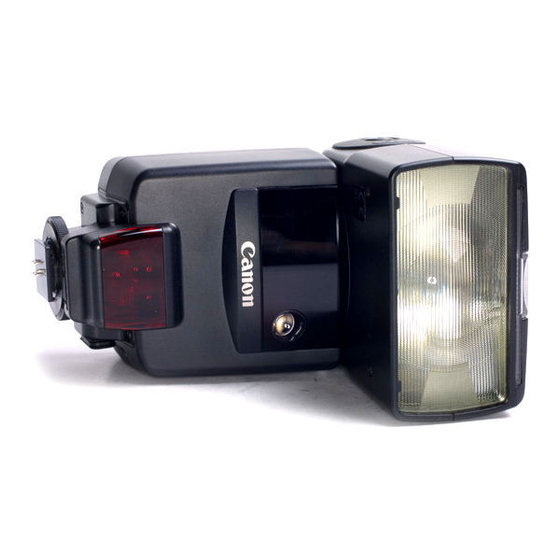- ページ 2
カメラレンズ Canon 540EZ - Speedlite - Hot-shoe clip-on FlashのPDF 取扱説明書をオンラインで閲覧またはダウンロードできます。Canon 540EZ - Speedlite - Hot-shoe clip-on Flash 4 ページ。 Camera flash
Canon 540EZ - Speedlite - Hot-shoe clip-on Flash にも: 取扱説明書 (32 ページ), パーツカタログ (12 ページ), 取扱説明書 (37 ページ), 取扱説明書 (32 ページ), マニュアル (36 ページ)

EOS Documentation - 540EZ Operator's Manual
Pagina 2 di 4
discharged. The total number of flash pulses that can be fired this way depends on the flash power
level setting, the frequency and the power source of the flash.
Sync Buttons
SYNC buttons (pressing both the + and – buttons together) turns on second curtain sync. This only
effects flash exposures with relatively long shutter speeds. Its primary purpose is to get light trails
to follow the flash instead of leading it. In normal sync mode the flash fires at the beginning of the
exposure. If the exposure is long and the subject moves, some of that movement might be recorded
on film, and it will look like it's in front of the flash exposure. Scenes like moving cars with
headlights on will appear to be moving backwards. Setting the sync to the second curtain makes the
trailing movement appear behind the subject. Second curtain sync can usually be left on without any
negative results. There will be a multi headed arrow symbol that shows on the right side of the LCD
when second curtain sync is on.
Zoom Button
ZOOM button cycles the flashes zoom head from Auto to 24, 28, 35, 50, 70, 80, 105 and then back
to auto. The LCD will show you what flash zoom setting is being selected and if it is not on auto
zoom there will be an "M" to the left of the zoom setting. You usually leave this to the auto setting
unless you have reason to change it. If you use the manual zoom settings the only thing to keep in
mind is to keep the flash head zoomed to the same focal length, or less, as your lens. This way the
flash will cover the whole area that the lens is seeing. Lenses longer than 105mm are not a problem.
Maximum flash distance increases with a longer zoom setting since the light beam is more
concentrated. The flashes manual distance calculator includes this info in its calculations. If you
need to cover a lens wider than 24mm, you can pull down the built-in flash diffuser that is stored
above the flash head. It is rated for lenses as wide as 18mm, but it actually has a lot of light fall off
near the edges so I wouldn't use it for lenses wider than 20mm. For better wide angle coverage you
can attach a bounce reflector to the flash head. Maximum flash distance will be reduced by about
half, but that's usually not a problem.
Pilot Button/Light
PILOT button/light will glow red when the flash capacitor is nearly fully charged. A true full
charge will actually take a few seconds more. The Ready Light will glow green for the "quick
flash" mode. This will allow you to take a TTL or A-TTL flash picture before the flash has fully
recycled. Be careful that you don't exceed its more limited range when doing this though. Pressing
the ready light will discharge the flash, normally at full power or whatever power level you have
manually selected if it is in manual mode.
The flash also has a Quick Flash mode where the pilot light shows green when it is partially
charged. You can take a picture then if you are in TTL or A-TTL mode, but it's maximum distance
is reduced to about half. This can be handy for rapid firing, but can also cause underexposed
pictures if you aren't careful.
Confirmation Light
CONFIRMATION light (the one that's not labeled, just to the right of the PILOT light) will glow
green for about two seconds if the camera's built-in flash meter determines that there has been
enough flash to give a proper exposure. This can be useful if your subject is at a great distance of if
you are bouncing the flash off a tall or dark ceiling.
Light Button
LIGHT button (just to the left of the MODE button) turns on the back light for the LCD. It goes off
by itself after a few seconds.
